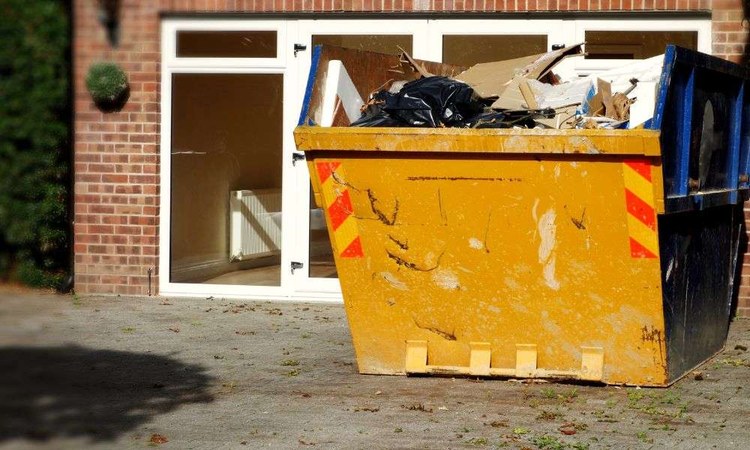Dumpster Rental
Dumpster rental services provide temporary waste containers for various cleanup, construction, and renovation projects. These containers come in different sizes to accommodate projects ranging from small home cleanouts to large construction debris removal. Renting a dumpster allows for efficient waste management by providing a centralized location to dispose of materials, which is then hauled away by the rental company when the project is complete. Understanding the rental process, available options, and considerations can help you choose the right dumpster for your specific needs.

Understanding Dumpster Rental Basics
Dumpster rental involves temporarily leasing a waste container from a disposal company. The process typically begins with determining the appropriate dumpster size for your project. Rental periods usually range from 3 to 14 days, though extensions are often available for an additional fee. Most companies deliver the empty dumpster to your location, place it according to your instructions, and later collect it when full or when the rental period ends. Understanding these basics helps ensure you select the right service for your waste disposal needs and avoid unexpected complications.
Different Types of Dumpsters for Rental
Several types of dumpsters are available depending on your specific project requirements. Roll-off dumpsters, the most common type for residential use, feature an open top and range from 10 to 40 cubic yards. Front-load dumpsters, typically smaller (2-8 cubic yards), are designed for regular commercial waste collection. Specialized dumpsters include concrete-only containers for construction projects and compactor dumpsters for businesses with high-volume waste. Some rental companies also offer specialty containers designed specifically for yard waste, recyclable materials, or hazardous materials that require separate disposal methods.
How to Choose the Right Dumpster Size
Selecting the appropriate dumpster size depends primarily on your project scope. For small home cleanouts or minor renovations, 10-yard dumpsters typically suffice. Medium-sized projects like single-room renovations or garage cleanouts usually require 20-yard containers. Larger renovation projects, roofing jobs, or whole-house cleanouts may need 30-yard dumpsters, while major construction or complete home cleanouts often require 40-yard containers. It’s generally recommended to choose a slightly larger size than initially estimated, as underestimating waste volume can result in additional fees for overfilling or requiring a second dumpster.
Dumpster Rental for Home Cleanouts
Home cleanouts represent one of the most common uses for dumpster rentals. Whether you’re decluttering, preparing for a move, dealing with an estate cleanout, or renovating, having a dedicated waste container simplifies the process considerably. For typical household cleanouts, 15-20 yard dumpsters generally provide sufficient capacity. These containers can accommodate furniture, household items, appliances, and general debris. When planning a home cleanout, consider sorting items beforehand to identify what can be donated or recycled, thereby maximizing dumpster space for genuine waste and potentially reducing environmental impact.
Permits and Regulations for Dumpster Placement
Before renting a dumpster, it’s essential to understand local regulations regarding placement and permits. Many municipalities require permits for dumpsters placed on public property, including streets and sidewalks. These permits typically cost between $10-$100 depending on location and duration. Even when placing dumpsters on private property, homeowner association rules may apply. Additionally, certain materials are universally prohibited from standard dumpsters, including hazardous waste, car batteries, tires, paints, chemicals, and certain electronics. Familiarizing yourself with these regulations helps avoid fines and ensures proper waste disposal.
Cost Factors for Dumpster Rental Services
Dumpster rental costs vary based on multiple factors including container size, rental duration, debris type, location, and weight limits. On average, residential dumpster rentals range from $300-$800 per week, depending on these variables. Most companies include a specific weight allowance in the base price, with overage fees applied for exceeding these limits. Additional costs may include permit fees, extended rental periods, and special handling fees for certain materials. Some companies offer all-inclusive pricing while others itemize each service component.
| Dumpster Size | Average Cost Range | Typical Weight Limit | Best Suited For |
|---|---|---|---|
| 10 Yard | $250-$400 | 1-3 tons | Small cleanouts, single room renovations |
| 20 Yard | $350-$550 | 3-4 tons | Medium renovations, garage cleanouts |
| 30 Yard | $450-$650 | 3.5-5 tons | Large renovations, whole house cleanouts |
| 40 Yard | $500-$800 | 5-6 tons | Construction projects, major cleanouts |
Prices, rates, or cost estimates mentioned in this article are based on the latest available information but may change over time. Independent research is advised before making financial decisions.
Tips for Efficient Dumpster Use
Maximizing your dumpster rental investment requires strategic planning. Start by breaking down large items to save space and distribute weight evenly throughout the container. Load heavier items first, placing them at the bottom and toward the center to maintain stability. Flat items should be positioned along the sides or laid flat on the bottom. Avoid overfilling the dumpster beyond the fill line, as this can result in additional charges and potential safety hazards during transport. For construction debris, consider separating recyclable materials like concrete, metal, or clean wood, as segregated disposal may reduce costs and environmental impact.
Conclusion
Dumpster rental provides a convenient solution for waste management during various projects, from home cleanouts to construction endeavors. By understanding the different dumpster types, appropriate sizes, placement regulations, and cost factors, you can make informed decisions that optimize your waste disposal process. Taking time to research local providers, clarify contract terms, and plan your waste disposal strategy will help ensure a smooth rental experience while potentially reducing costs and environmental impact.




